“Leaders don’t spend all day insulting people,” Gov. Tim Walz solemnly informed a national audience on Wednesday night, 24 hours after a former president joked about the size of Donald Trump’s dong on the same stage.
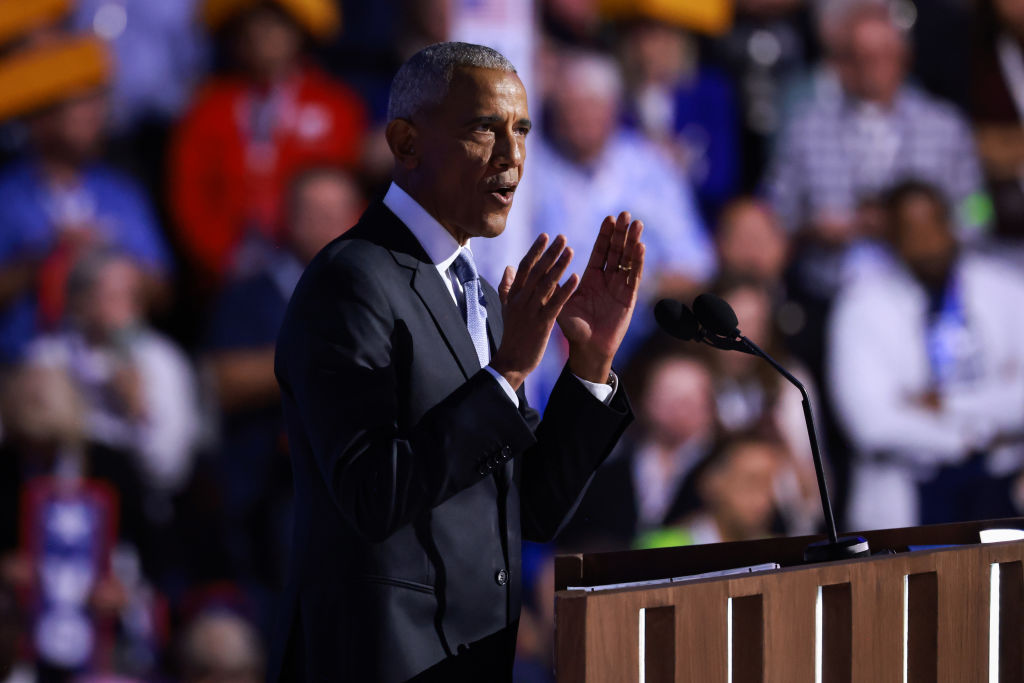
Democrats haven’t spent “all day” insulting their opponent at their convention this week, I suppose, but it sure feels like they have. Their program has been conspicuously light on policy, in keeping with Kamala Harris’ vacuous “blank slate” campaign, and heavy on personal mockery of Trump. With some babbling about “joy” mixed in, of course.
That’s the last month of presidential politics in a microcosm. Democrats “started to stray from their political politesse after Trump won in 2016,” Politico observed on Wednesday, “and appear to have deserted it entirely this cycle as the Harris campaign issues snarky press releases, digs against its ‘weird’ competitors and couch jokes aimed at taunting Republican vice presidential nominee J.D. Vance.”
“When they go low, we go high,” Michelle Obama told the convention eight years ago, encouraging her party to rise above Trump’s insult-comic shtick in its own messaging. Democrats went on to lose that election, then nearly lost again in 2020 in a race they were supposed to win comfortably.
So they’re leaning into insults this time. When they go low, we go low.
Trump has noticed:
“Do I still have to stick policy?” he whined, irritated at the counsel he’s clearly received from his advisers. All of his grievances are ultimately grievances about being treated unfairly; here too, he seemed to find it “unfair” that Obama got to impugn his manhood while his own staff implores him not to respond in kind.
The restraint of Trump’s aides, though, comes not from an unwillingness to fight dirty but a belief that their man stands a better chance of winning if he goes high—or what passes for it by Trump standards—while Democrats go low.
In other words, we’ve ended up with a strange reversal of the last two presidential cycles. Traditionally, it’s been Trump who’s gotten personal and Democrats who’ve claimed to care about policy. This time it’s Democrats who are getting personal and the Trump campaign that claims to be focused on policy.
Does that switcheroo make strategic sense?
Pounding the table.
Let’s stipulate up front that it’s incredibly silly to offer Trump strategic advice, especially on this subject. No matter how compelling the case to go high is, he’s going to go low.
“This is just the way I am. I hate my opponent. I hate my opponents,” he recently told a confidant according to Marc Caputo’s latest reporting for The Bulwark. He was even blunter in what he allegedly said to another adviser about his approach to Harris: “I’m going to be mean.”
Character is destiny.
But let’s pretend that, through great effort, his staff convinced him to stick more or less to policy on the trail with only occasional cracks about Harris’ low intelligence. Would a more disciplined, substantive message improve his chances of winning?
I think so. Not everyone does.
Last week, Jonathan Last made the case that getting nasty is Trump’s path to victory. Because he has a low ceiling of 47 percent or so of the popular vote, Last argued, he needs to maximize turnout among the sort of low-propensity voters who typically don’t show up for elections but do tend to show up for him.
How does he get those voters excited to vote? Not by prattling on about corporate tax cuts. He does it, Last argued, by giving them “the Trump Show, with the guy who sets himself on fire in public and drags his opponents into the mud with him.” The more successful he is at racializing the campaign, throwing Harris and her party off-message, the more likely he is to “prevent her from becoming a cultural icon, the kind of figure who crosses over and transcends politics.”
Let’s begin with an old saying that every lawyer knows. When the facts are on your side, pound the facts; when the law is on your side, pound the law; when neither is on your side, pound the table.
By and large, the policy facts in this campaign are on Trump’s side. Why should he pound the table instead of pounding the facts?
He has three issues working in his favor that any challenger would kill for. One is inflation, which produced a landslide for the out-party the last time it mattered in a presidential election. The second is the hair-raising slowdown in job growth, saddling Harris with recession jitters in the home stretch of the campaign. The third is the Biden administration’s fiasco at the southern border, a crisis for which Harris herself bears a degree of direct responsibility.
When she replaced the president as nominee, Republicans had less than four months to define her for voters who hadn’t paid her much attention as vice president. They’ve already squandered the first month. Harris has run an effective “vibes” campaign so far, apparently calculating that a sharply optimistic contrast with Trump in tone paired with an all-things-to-all-people “blank slate” on policy would raise her popularity among voters without alienating anyone. It worked.
My strong suspicion is that Trump trying to counterprogram those good vibes with bad ones—she’s black and stupid and slept her way to the top!—will not work. If anything, it’ll make the tonal contrast worse. What might work is convincing voters that underneath all the “joy” argle-bargle is a candidate who’s effectively running for Joe Biden’s second term, with all the failures to come that that implies.
Remember: To a surprising degree, voters don’t blame Harris for the president’s foibles. Just 1 in 3 believe she had a “great deal” or “good amount” of influence over the Biden administration’s economic policies. She’s also performing wildly better than her old running mate did among the so-called “double haters” who dislike both Biden and Trump. One recent poll found her leading by 42 points among that same cohort. By comparison, the president had led Trump by just 9.
On Thursday, the New York Times published a story about the demographic cohorts whose enthusiasm for Harris has grown the most and least since she replaced Biden as her party’s nominee. By far, the group that’s shifted most dramatically in her favor are those who hold a “somewhat unfavorable” view of Trump. In May, those voters favored Trump over Biden by 11 points notwithstanding their antipathy to him. Today, they favor Harris over Trump by … 36.
She’s carrying less Biden baggage than the right would have hoped. They should probably do something about it, no?
Republicans spent the pre-Harris stage of this campaign arguing that a vote for Biden was a vote for her insofar as his decline made it likely that she’d inherit the presidency one way or another in his second term. Now that Harris has proved to be a more formidable and popular opponent than anyone expected, they should argue that a vote for her is a vote for Biden—or for Bidenism, at least, in terms of what a Harris presidency would look like policy-wise.
If nothing else, by focusing on policy Trump would highlight Harris’ embarrassing refusal to do the same. The strongest Republican line of attack on her to date has been noting the lengths to which she’s gone to avoid interviews, either because she has nothing thoughtful to say about key issues or because she fears she’ll devolve into the sort of word salads to which she’s prone when speaking extemporaneously. To all appearances thus far, she’s an empty suit.
It seems to me that if Team Trump is worried about Harris becoming an Obama-esque “cultural icon” who “transcends politics,” the way to prevent it is to pull her back down to earth by grounding her in bottom-line policy disputes. Let’s see how swing voters who are grooving on “joy” right now feel when they’re face-to-face with her gimmicky economic policies.
There’s another problem with Trump going low, though. Several, actually.
A contest of motivation.
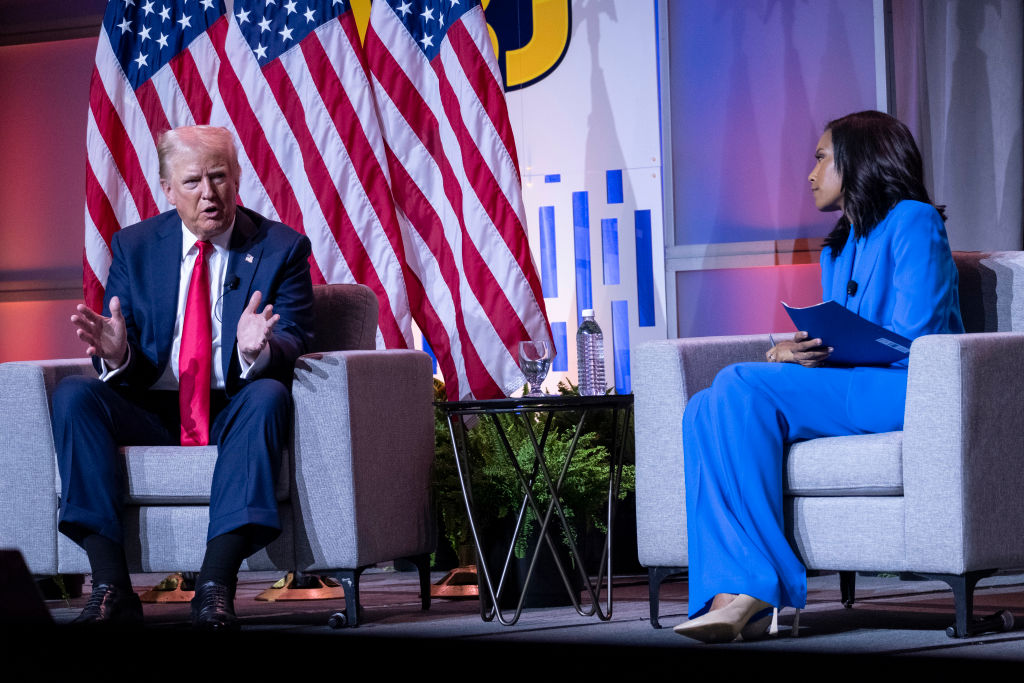
Does Donald Trump’s base of low-propensity voters, of all people, really need nasty insults from him about Harris to get motivated to turn out against her?
He’s spent the last 18 months getting them hopped up on promises of “retribution” against enemies various and sundry. His polling went up after he was indicted. The sort of fringy populist media that irregular voters consume will have plenty to say about the future of an America governed by a progressive black woman from California even if Trump himself does not.
And insofar as they need further reason to turn out, watching “Barack Hussein Obama” and other Democrats mock their hero in public should do the trick. That’s the thing about getting personal with an opponent: It offends their supporters, and an offended supporter is a motivated supporter.
But that works both ways, of course.
When Biden was still his opponent, Trump was making real gains with black voters. Those gains appear to be eroding with Harris now leading the ticket, but there’s reason to think younger black voters—particularly younger black men—might still be open to crossing over. Younger voters of all races tend to earn less, after all, and during the Biden years, lower earners have had to worry about a rising cost of living and competition from immigrant labor. There’s fertile ground for Trump in that.
But how receptive to him will those young voters, especially black ones, remain if he insists on racializing the campaign? How many young voters who weren’t planning to vote at all, of which there are many, will think again if he inflames their progressive attitudes about race?
Relatedly, how receptive will women voters remain if he resorts to impugning Harris in sexist ways? Trump has always had problems with that demographic but the situation is turning critical for him now that the new nominee has begun putting up big margins among women. Calling Harris “stupid” is destined to offend some of them, especially after she proves she knows her stuff when they debate.
And an offended supporter is a motivated supporter.
We needn’t get too deep into the weeds of which groups will and won’t find Trump’s attacks on Harris alienating, though. He has a broader problem in “going low” that she and her Democratic allies don’t share: Namely, he’s been going low for nine years, normal people are sick to death of him, and seeing him resort to it again in the thick of another campaign is apt to remind them of why they came to dislike him in the first place.
Americans have a splitting headache from listening to him pound the table for so long.
The whole theory of Harris’ dumb “joy” campaign is that it’s time to end the dark political mood that began in 2015 and has since led both parties to argue that the fate of democracy hinges on the results of each coming election. Voters are exhausted, just as they were in 2008 when another trailblazing Democrat offered them a fresh start from a turbulent era dominated by a disliked Republican. Trump “going low” on her would remind them that, if they reelect him, they’ll spend the next four years sinking deeper into that exhaustion.
Worse, it would also leave her to continue running on “vibes” unimpeded.
Every day that Trump isn’t pressuring Harris to explain herself on policy is a day she and Walz get to luxuriate in the tonal contrast they’ve created. If we spend the rest of the race with the two of them needling Trump as “weird” while Trump bellows about low-IQ black communists destroying the country, I think Harris wins. Trump supporters might love “the Trump show,” but there’s a reason he’s never surpassed 47 percent of the vote in a national election.
In fact, my theory of why Obama and other speakers at the Democratic convention this week have been keen to “go low” with Trump is that they’re trying to provoke him. They’re not just taking shots at a hated opponent for the, er, “joy” of taking shots. The personal insults are bait, knowing how thin his skin is, how zealously he guards his reputation as a “counterpuncher,” and how difficult it’s been for aides to keep him on-message as he spirals amid Harris’ polling surge.
Democrats know Harris has a problem by having to carry Biden’s policy baggage and they know that a disciplined Republican campaign would force her to carry it by reminding voters of it regularly. So they’re playing off of Trump’s indiscipline, antagonizing him with personal attacks in hopes that he’ll get distracted and respond in kind. Each new tangent and ensuing tantrum allows her to set those bags down.
He prides himself on being a fighter, and a fighter can’t just stand there and take his opponent’s shots, right? I mean, a smart one could when it’s to his advantage to do so, but not one who’s more concerned with looking tough than with actually winning the fight.
I’m even tempted to speculate that selecting Walz as her running mate is part of Harris’ strategy to distract Trump and the GOP from her policy record. I don’t think that’s true, to be clear, but Walz’s jabs at Republicans for being “weird” clearly got under Trump’s skin and have made him a recurring target for the right on everything from his military record to his distortions of his wife’s fertility treatments to his alleged sympathies for Chinese communism.
Those attacks are all fair game, of course, but they’re unlikely to draw much blood from the Democratic ticket, as critiques of the vice presidential nominee seldom do. “If you’re still talking about Tim Walz’s bio this week instead of Kamala Harris’ record you’ve lost the plot, badly,” conservative lobbyist Liam Donovan warned Republicans … a week ago.
All of this makes for an interesting backdrop for Kamala Harris’ acceptance speech on day four of the convention. Whatever will she talk about?
She can’t talk policy, or at least not in great detail, as that would upset her “blank slate” strategy. Will she too “go low” on Trump, then?
I doubt it. Traditionally, presidential candidates have left the nastier attacks on their opponent to surrogates. (Trump is nontraditional, in every way.) That’s especially true when the candidate is running a campaign that’s heavy on sunny, optimistic “vibes” relative to policy, as was the case with Barack Obama in 2008 and with Harris now. To maintain their status as hopey-changey repositories for undecided voters’ dreams, they had/have to keep their own hands clean.
And like Obama before her, Harris might have a special reason to remain above the political fray. Because there are voters who’ll struggle to view a black man or black woman as “presidential,” a black candidate will want to be that much more presidential in their own tone. I’m reminded of the good cop/bad cop routine Raphael Warnock and Jon Ossoff pulled off in Georgia three years ago when they both won their Senate runoffs. Ossoff, who’s white, played the attack dog in the race against Warnock’s opponent while Warnock, who’s black, ran ads featuring himself holding puppies.
Harris will be more puppy-cuddler than attack dog tonight, I suspect. She’ll take some hard shots at Trump about January 6 and abortion, but I’ll be surprised if we see any Obama-style low blows from her about, say, the size of “little Donald.”
Her address will be shorter than most presidential acceptance speeches (much shorter than Trump’s!), I’d guess, and even denser with platitudes than usual. “Better to remain silent and be thought a fool than to speak and remove all doubt” has been her media strategy since the start of her campaign. She’ll seek to follow it again tonight as much as the format will allow.


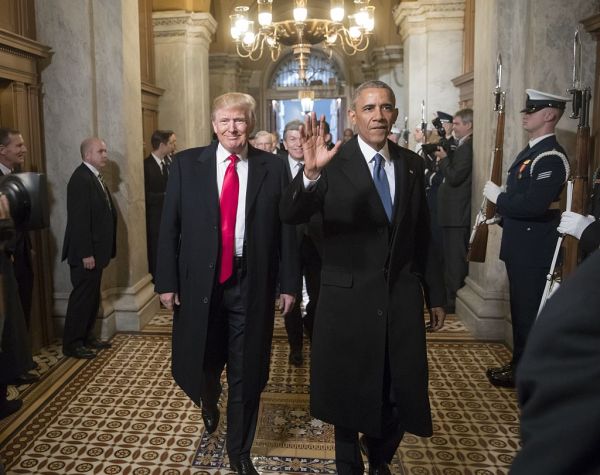
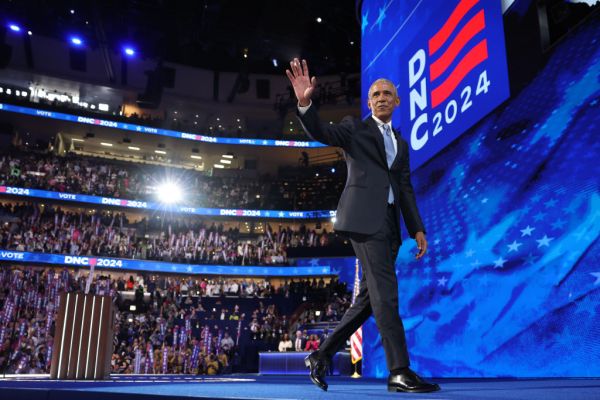

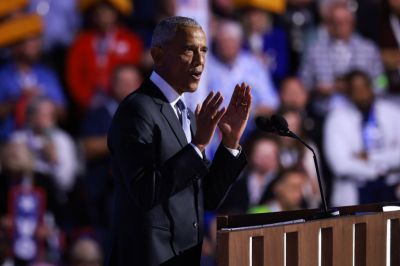
Please note that we at The Dispatch hold ourselves, our work, and our commenters to a higher standard than other places on the internet. We welcome comments that foster genuine debate or discussion—including comments critical of us or our work—but responses that include ad hominem attacks on fellow Dispatch members or are intended to stoke fear and anger may be moderated.
With your membership, you only have the ability to comment on The Morning Dispatch articles. Consider upgrading to join the conversation everywhere.